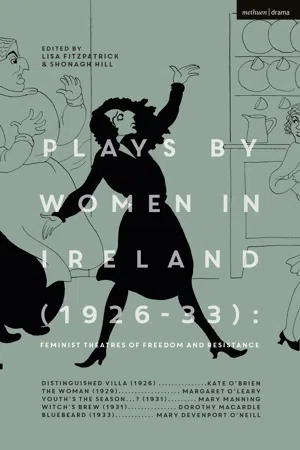![]()
Youth’s the Season-?
Mary Manning
Premiered at the Gate Theatre, Dublin, on 8 December, 1931. The script included here is a revised version that was performed in 1932 and published in Plays of Changing Ireland (Macmillan, 1936).
| Mrs Millington | Florence Morrison |
| Desmond | Micheál Mac Liammóir |
| Deirdre | Meriel Moore |
| Constance | Coralie Carmichael |
| Toots Ellerslie | Betty Chancellor |
| Terence Killigrew | Hilton Edwards |
| Horace Egosmith | Rodney Homer |
| Harry Middleton | Lionel Dymoke |
| Gerald Parr, M.B. | Harry Laing |
| Willie Sullivan | Rex Mackey |
| Pearl Harris | Hazel Ellis |
| Mary | Diana Vernon |
| |
| Director & Lighting | Hilton Edwards |
| Set | Micheál Mac Liammóir |
Mary Manning (1906–99) was born in Dublin and attended Alexandra College, where she was taught English by Dorothy Macardle. Before embarking on her playwrighting career, Manning studied acting with Sara Allgood and performed in both Abbey Theatre and Dublin Drama League productions. She served as understudy for Ria Mooney during tours of the Irish Players. Manning was a theatre critic for the Irish Independent, as well as founder and editor of Motley, the Gate Theatre in-house magazine. Her first play, Youth’s the Season– ? (1931), offers a searing critique of post-colonial Ireland through examination of the lives of a young, urban, educated and privileged set. She wrote two more plays, both of which were staged at the Gate: Storm over Wicklow (1933) and Happy Family (1934). Youth’s the Season – ? was the most successful: it was revived at the Gate in 1933 (directed by Denis Johnston) and was produced at London’s Westminster Theatre in 1937. Manning’s talents extended to adapting literary works for the screen and she also produced short films. She moved to America in 1935, where her engagement with experimental art continued unabated in the post-war arts scene. During her time at The Poets’ Theatre, Cambridge, Massachusetts, Manning introduced a generation of young writers to avant-garde work (see Reynolds 2016). The Voice of Shem, her theatrical adaptation of James Joyce’s Finnegans Wake, premiered in 1955, under her direction. Samuel Beckett, a childhood friend of Manning’s, granted her the rights to stage the American premiere of All That Fall in 1958.
Youth’s the Season – ? offers the perspective of a generation who have come of age following the fight for Independence and the Civil War. The stark reality is that Free State Ireland offers ‘no scope’ for them. Societal expectations are stultifying and overwhelming; despair, depression and death permeate their lives. For the women, there are no options beyond a passive femininity and marriage, while the men are limited to restrictive notions of masculinity which incorporate ‘the perfect city man’ in bowler hat, an ‘Empire Builder’ and the rugged ‘Hairy Man’. They are ‘the Imitation Bright Young People’, whose performances reveal the hollow masquerade of restrictive conceptions of gender, sexuality and Irishness. The ‘mental and moral indigestion’ of Dublin encumbers the lives of the central characters (Desmond, Toots and Terence). Desmond’s desire to work as a designer in London is quashed as he is forced to carry on the patrilineal family tradition; he describes working in his father’s office as ‘death in life for me’. The ‘shambling literary loafer’, Terence, commits suicide in the devastating conclusion to the play, while Toots is left pleading for escape: ‘Let me out.’ Beneath the sparkling social comedy, the play is replete with violence and dead ends, supporting the questioning title which references the song lyrics, ‘Youth’s the season made for joy’. Manning’s insertion of the question mark affirms Desmond’s angry declaration that it is ‘a bloody lie’.
The veneer of cosmopolitan energy and wit belies the dullness of lives moulded by conformity; yet the play offers a challenge to the Free State’s coherence around gendered identity: ‘If Catholicism and sober masculinity were identified as the key characteristics of Irishness, doubtful sexual orientation and failure to act out polarized gender roles spelt the destabilization of hegemonic national identity’ (Leeney 2010: 137). Desmond states that, ‘I am effeminate. It’s my temperament. I was born that way’; a line amplified by the fact that openly gay actor Micheál Mac Liammóir played the role in the premiere production. Key to the destabilization of identity, and to exposure of the grotesque process of being ‘buried alive’, is Manning’s use of theatrical expressionism as evidenced by the skilfully interwoven episodes of Act Two. In this act Desmond’s birthday party is presented as a ‘farewell to happiness’ and an attempt to shock the audience out of complacency. Terence’s belief that ‘this house needs to be shaken to its bourgeois foundations’ resonates with Manning’s annihilation of the realist domestic setting with expressionist techniques. In the premiere production, Hilton Edwards’ expertise in the application of expressionist techniques in both direction and lighting enabled him to augment the fast and fluid mise-en-scène which aided Irish audiences ‘to confront and experience affectively the process of modernisation that the country was undergoing’ (Walsh 2018: 41). In the same year as Manning’s playwrighting debut, Sophie Treadwell’s Machinal received its British premiere; a play which also draws on expressionist techniques to convey women’s experiences of modernity. Leeney notes the influence of Noël Coward on Manning and asserts: ‘Remarkably, what Coward achieves for barely five pages in The Vor...
